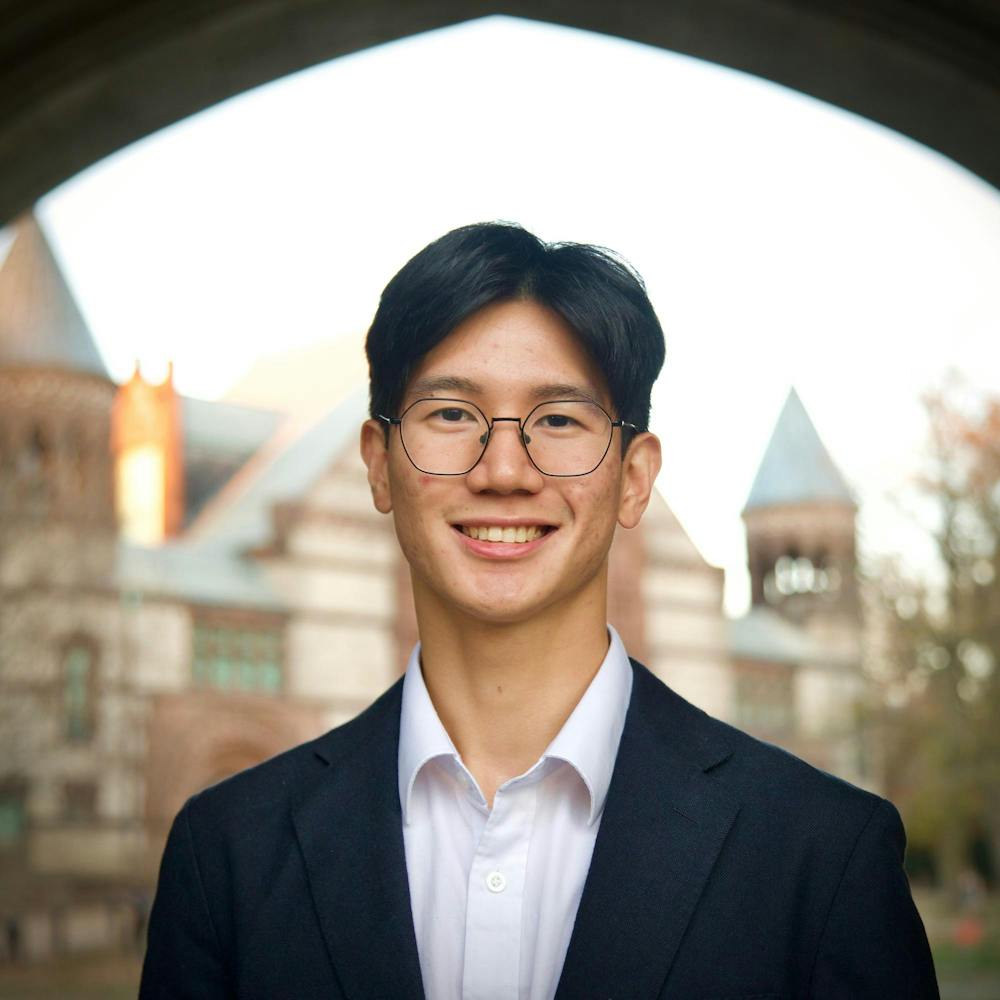Enzo Kho ’26 and Aishwarya Swamidurai ’26 have been elected as the president and vice president, respectively, of the Undergraduate Student Government (USG) in an unusual split-ticket win. All four referenda on the ballot also passed. The USG announced the results via an email to the student body on Nov. 29.
Breaking with election precedent, every race in the Winter 2024 election was contested, with 50 candidates running for 16 seats. Over the past 12 years, there has been at least one uncontested race in every election cycle.
According to Chief Elections Manager Alex Sorgini ’26, 53 percent of the undergraduate student body voted on the Executive Committee and referenda, translating to 3,043 votes cast. Last year, 2,285 votes were cast in the USG presidential election.
Kho, whose running mate was Karen Villanueva ’27, won 1,446–1,244 against Uma Fox ’26, capturing a total of 54 percent of ballots cast. Swamidurai, who ran with Fox, won just over 51 percent of votes in a 1,345–1,267 victory. Swamidurai’s 78-vote margin of victory was the closest race down the Executive Committee ballot.
Although Kho and Swamidurai ran on different platforms, they both wrote to The Daily Princetonian that they look forward to collaborating over their shared ideas and compromising over differences.
“I’m confident that Aishwarya and I share the same goal and vision: to serve the student body to the best of our abilities. We’ll connect soon, but I don’t anticipate any concerns, as we’ve already built a strong working relationship within the USG Senate,” Kho wrote. “Her consistent participation in our weekly Executive Committee meetings and her volunteer efforts in numerous social committee events of ours reflect her dedication and commitment.”
Swamidurai previously served on the USG as U-Councilor chair on the Council of the Princeton University Community.
“I deeply respect him and look forward to working with him because I know we both share the same goal of authentically representing students. We share a lot of common ideas but I’m also excited for us to build upon each other’s unique visions, because that will only contribute to a more holistic USG overall,” Swamidurai shared.

All four of the referenda that were on the ballot passed with at least 65 percent of votes in favor. Referendum No. 2, which called on the University to improve employment standards for undergraduate workers, received the most support, with 94 percent of votes in favor, while Referendum No. 5, which called on the University to divest its endowment from companies involved in weapons manufacturing, was the most divided, passing with only 68 percent of votes in favor.
In the days leading up to the election, Referendum No. 5 was the only measure that had formal, organized opposition. Referenda No. 3 and 4 called for the University to dissociate from fossil fuels companies and to allow language classes to be taken pass/D/fail, respectively.
In an email to The Daily Princetonian, Kho said that he’s “looking forward to advocating for policy changes at the university and beginning to implement our platform initiatives.” Kho previously served as the USG Social Committee chair, where he led events like Lawnparties and, most recently, TigerTies. He shared with the ‘Prince’ that he would focus on “sustained advocacy and ongoing discussions” around the passed referenda.
“I’ll ensure that these referenda reach the appropriate offices and will work closely with university administrators and the groups involved, ensuring they don’t die down,” Kho wrote.

Swamidurai wrote to the ‘Prince’ that she is “grateful to everyone for engaging so actively in our elections process this year and for giving me this opportunity to serve the student body.” She continued, stating that as vice president, she hopes to continue policy conversations that “USG has already started on issues of equity, community, and more.”
All of this cycle’s referenda operate under the “advisory power” of the USG, according to the Nov. 10 referenda language review. Now that they have passed, the newly-elected USG will author a report including “recommendations for other relevant University or student groups to further the undergraduates’ official position,” according to the body’s election bylaws.
The remainder of the elected Executive Committee includes Quentin Colón Roosevelt ’27 as treasurer; Anuj Krishnan ’27 as Undergraduate Student Life Committee chair; Connor Romberg ’27 as Academics Committee chair; Aum Dhruv ’27 as Social Committee chair; Oscar Barrios ’27 as Campus & Community Affairs Committee chair; Sastha Tripathi ’28 as Sustainability Committee chair; Brian Mhando ’26 as Diversity, Equity, and Inclusion Committee chair; and Allen Nieva ’26 as Mental Health Committee chair.
Tripathi, whose sister Srista Tripathi ’25 is the current USG Vice President, is the only member of the Class of 2028 on the executive committee.
Additionally, two Senators for each of the first-year, sophomore, and junior classes were elected. Raghav Pradhan ’28, Vivian Chang ’28, Jerry Atunku ’27, and Hriday Unadkat ’26 were newly elected, while Siddhant Shah ’27 and Samuel Kligman ’26 retained their seats.
Christopher Bao is an assistant News editor and the accessibility director for the ‘Prince.’ He is from Princeton, N.J. and typically covers town politics and life.
Victoria Davies is an assistant News editor for the ‘Prince’ who covers University operations.
Please send any corrections to corrections[at]dailyprincetonian.com.








